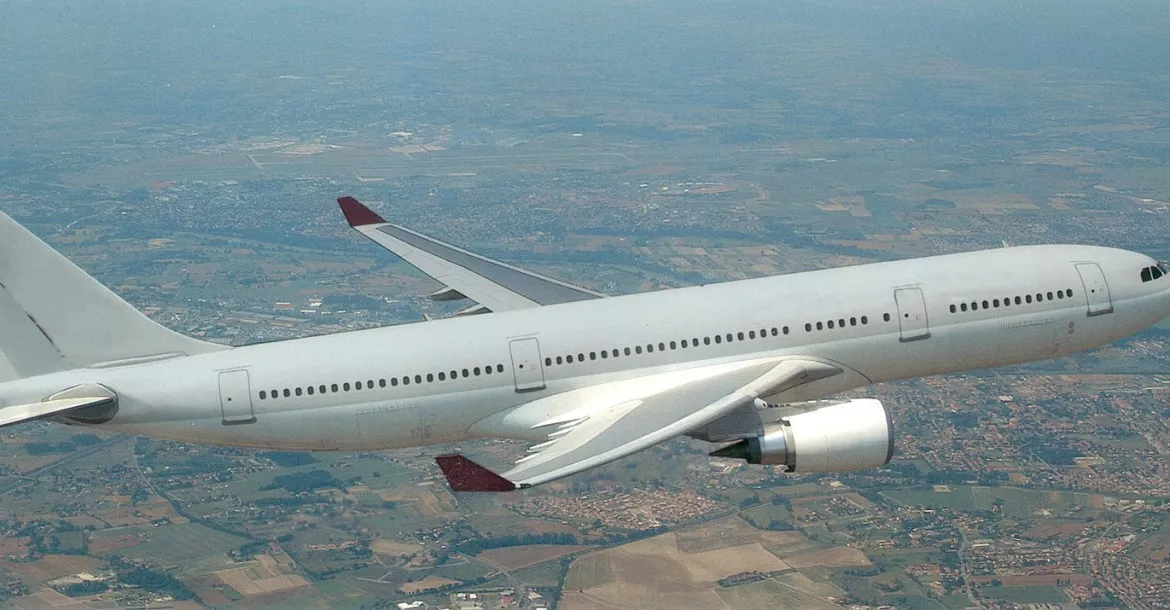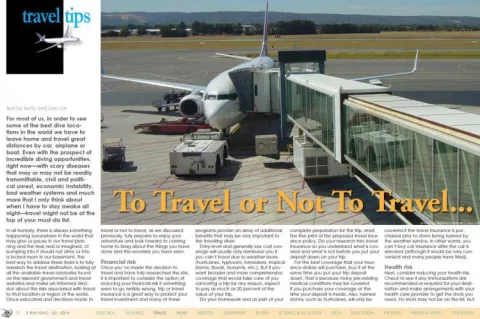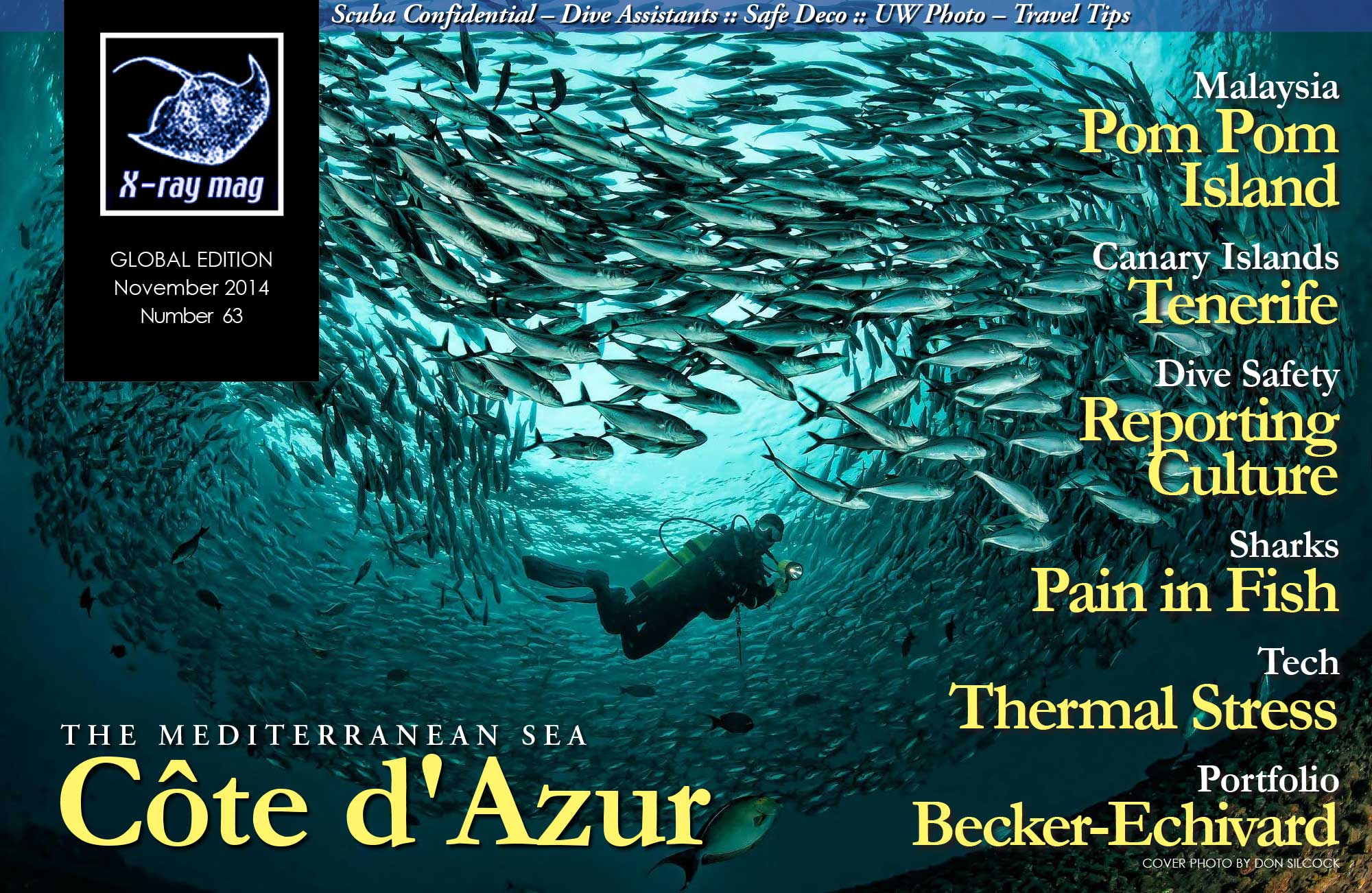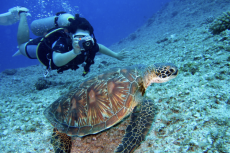For most of us, in order to see some of the best dive locations in the world we have to leave home and travel great distances by car, airplane or boat. Even with the prospect of incredible diving opportunities, right now—with scary diseases that may or may not be readily transmittable, civil and political unrest, economic instability, bad weather systems and much more that I only think about when I have to stay awake all night—travel might not be at the top of your must-do list.
Contributed by
Factfile
Dan and Betty Orr are consultants with over 80 years of combined diving industry experience.
They provide diving safety and emergency management consultation, product review and evaluation, product and services marketing and educational expertise.
For more information, visit: www.dan-orrconsulting.com
In all honesty, there is always something happening somewhere in the world that may give us pause in our travel planning and the fear, real or imagined, of bumping into it should not drive us into a locked room in our basement. The best way to address these fears is to fully research the travel destination, looking at all the available travel advisories found on the relevant government and travel websites and make an informed decision about the risks associated with travel to that location or region of the world. Once educated and decisions made to travel or not to travel, as we discussed previously, fully prepare to enjoy your adventure and look forward to coming home to brag about the things you have done and the wonders you have seen.
Financial risk
Once you’ve made the decision to travel and have fully researched the site, it is important to consider the option of reducing your financial risk if something were to go terribly wrong. Trip or travel insurance is a great way to protect your travel investment and many of these programs provide an array of additional benefits that may be very important to the traveling diver.
Entry-level and generally low cost coverage will usually only reimburse you if you can’t travel due to weather issues (hurricanes, typhoons, tornadoes, tropical storms, floods, tsunamis, etc.). But if you want broader and more comprehensive coverage that would take care of you canceling a trip for any reason, expect to pay as much as 20 percent of the value of your trip.
Do your homework and as part of your complete preparation for the trip, read the fine print of the proposed travel insurance policy. Do your research into travel insurance so you understand what is covered and what is not before you put your deposit down on your trip. For the best coverage that your insurance dollars will purchase, buy it at the same time you put your trip deposit down. That is because many pre-existing medical conditions may be covered if you purchase your coverage at the time your deposit is made. Also, named storms, such as hurricanes, will only be covered if the travel insurance is purchased prior to storm being named by the weather service. In other words, you can’t buy car insurance after the car is wrecked (although it would be very convenient and many people have tried).
Health risk
Next, consider reducing your health risk. Check to see if any immunizations are recommended or required for your destination and make arrangements with your health care provider to get the shots you need. Flu shots may not be on the list, but you should make sure that is current as well. Once you have all your required or recommended immunizations, it is a good idea to put together a personalized first aid kit that includes anti-emetics and anti-diarrheal medicines. As careful as you may be, eating foods or drinking liquids in a foreign country could seriously disagree with your digestive tract. Ask your physician if they can recommend any additions to that kit. Nothing beats a professional’s opinion.
If you do carry any prescription medications out of the country, make sure you have them in the original bottle with the pharmacy and physician information clearly labeled on the bottle. Any unknown or suspect medications could be confiscated by customs agents as contraband.
Wash your hands
An often-overlooked illness preventative mechanism is simply washing your hands often and thoroughly. Carry hand sanitizer to use in addition to soap and water. While your hands may be clean, surfaces you come in contact with during travel may not. Considering all the people using public and commercial transportation, you never know what someone did who sat in your seat previously. Plus, planes and other forms of public transportation are turned around so rapidly these days that they are given only the most cursory cleanings between trips. Disinfecting wipes are essential to clean arm rests, tray tables and other often touched surfaces before using them.
Medical evacuation
Now, let’s consider what you would do if you were injured or taken ill during a trip and you required emergency medical evacuation. Without considering the logistics involved if you were in a very remote dive or travel location, it is important to make sure that you have some sort of financial coverage for medical evacuations. For instance, Divers Alert Network (DAN) provides medical evacuation coverage for its members, and even though they may constitute a very active diving population, the vast majority of medical evacuations are non-diving related. Medical evacuations from even the most popular dive or travel location can be financially catastrophic if you do not have proper coverage. In many exotic locations, there may be no operational recompression chambers or even a rudimentary clinic, so divers and travelers may have to rely on medical evacuation services to get comprehensive medical care.
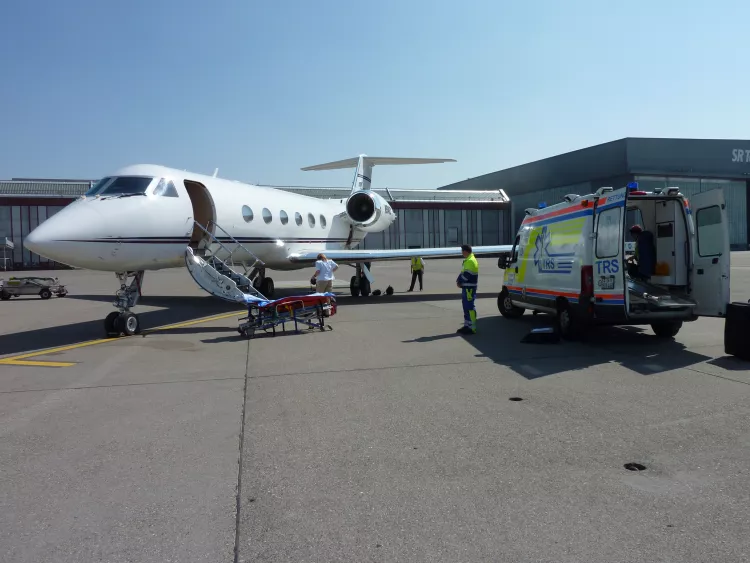
If the injury is diving-related, the injured person may require evacuation in a specialized aircraft capable of maintaining cabin pressures approximating 1 atmosphere as well as a specialized medical team. Emergency medical evacuation to the nearest appropriate medical facility can cost tens of thousands of dollars. Most diving accident insurance and even some of the major credit cards may include some form of medical evacuation coverage in their benefit package. Just be sure that the one you have will evacuate you for any illness or injury, not just scuba diving. Make sure you know what coverage you have before traveling and understand any and all exclusions.
Some evacuation coverage may be restricted to specified distances away from home or may exclude certain regions or countries. It is up to the consumer to know the limits of their benefits or coverage. Many do offer broad coverage that you may not be aware of because they are in the fine print (sorry). The old adage, “large print giveth and small (fine) print taketh away” is certainly true with travel insurance/assistance benefits. Know what coverage you’ve got and know how to use it. Hopefully, you’ll never need it but it is better to have it and not need it than the alternative. This is all part of being fully prepared to fully enjoy what the wide world of diving has to offer. It’s hard to put a value on peace but when you are far from home, it’s just about priceless! ■

